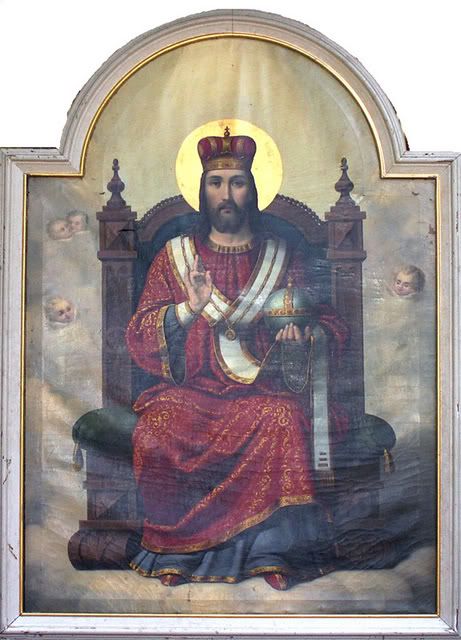Last Sunday in October - Feast of Christ the King

[Image of Christ the King, taken from Pius XI: The Kingship of Christ]
(The following is excerpted from the supplement in Volume XIV of the 1983 Marian House edition of the English translation of Dom Prosper Guéranger's 'The Liturgical Year' by the Benedictines of Stanbrook. As the feast of Christ the King wasn't instituted until the 1920s, Dom Guéranger likely didn't write this entry, but a later Benedictine religious.)
"The Kingdom of Heaven - Holy Church - is seen bringing forth out of her treature 'things new and old.'....Hence, guided by the Holy Spirit, of [H]im who has promised to be with her not merely for a few centuries but unto the end of the world, she defines or emphasizes certain points of doctrine as she sees fit, considering the needs of the times. We have an example in the institution of the feast of the Kingship of Our Lord Jesus Christ by the Sovereign Pontiff, Pope Pius XI, in the jubilee year 1925, and explained to the faithful in the Encyclical Quas Primas."
"Christians have ever hailed our divine Lord as King of Kings and Lord of Lords. It was as a King that the representatives of the Eastern world came to adore [H]im in a manger; it was as a King, albeit not knowing what he did, that the official representative of the Western world lifted [H]im up upon the Cross. The patriarchs and prophets of the old dispensation foretold [H]is royalty; [H]e spoke constantly of [H]is kingdom: when asked plainly whether [He] were in truth a king by the representative of Caesar, [H]e acknowledged that such indeed [H]e was, though of a kingdom not of this world...."
"Yet though [H]is is a spiritual kingdom, opposed to no just earthly polity, 'it would be a grave error to say that Christ has no authority whatever in civil affairs, since by virtue of the absolute empire over all creatures committed to [H]im by the Father, all things are in [H]is power. All men, whether collectively or individually, are under the dominion of Christ. In [H]im is the salvation of the individual, in [H]im is the salvation of society.'"
"To-day, we sadly behold 'a world undone,' largely paganized in principles and outlook, and, in recent years, in one country even glorying in the name 'pagan.' At the best, governments mostly ignore God; and at the worst, openly fight against [H]im, as we of to-day are witnessing in the Old World and in the New. Even the statesmen's well-meant efforts to find a remedy for present ills and, above all, to secure world peace, prove futile because, whereas peace is from Christ, and possibly only in the Kingdom of Christ, [H]is [N]ame is never mentioned throughout their deliberations or their documents. Christ is kept out of the State schools and seats of higher education; and the rising generations seem to be taught anything and everything save to know, love, and serve [H]im. Art and literature all too frequently reflect the same tendencies."
"And since the spirit of evil reigns inevitably wherever the spirit of Christ has ceased to reign, in public and in private men are flouting the moral laws of God, and some of the worst abominations of ancient paganism are becoming matters of every-day life. Moreover, be it remembered, modern paganism is worse than that of the ancient world, in that the former knows what ides as the latter did not. There is now an intense, positive hatred of Jesus Christ in the militant atheist, which differs in kind from the attitude of the fiercest Roman or Eastern persecutor: 'If I had not come and spoken to them... if I had not done among them the works that no other man hath done, they would not have sin; but now they have both seen and hated both me and my Father' [John 25: 22, 24]."
"Ever as practical as she is supernatural, the Church is not content with merely deploring the evil, nor even with counteracting it by sound teaching. She would also make definite reparation to the divine majesty thus denied and defied; to [H]im whose royalty is slighted and insulted. Something must be done by those who, in a measure, understand and love, in order to atone for those who do not. 'To repair the crime...which denies God's rights over the human society whose author [H]e is, we must exalt Jesus Christ as King over all individuals, families, and peoples. If [H]is universal royalty be proclaimed and [H]is reign in society recognized, one of the principal evils of the modern world - the secularizing of public and private life - will be attacked at its roots' [quoted from L'Amour de Dieu et de la Croix de Jesus, P. Garrigou-Lagrange, O.P.]. Hence we have the special exhortation of the Vicar of Christ, and the institution of the feast of this divine Kingship...."

